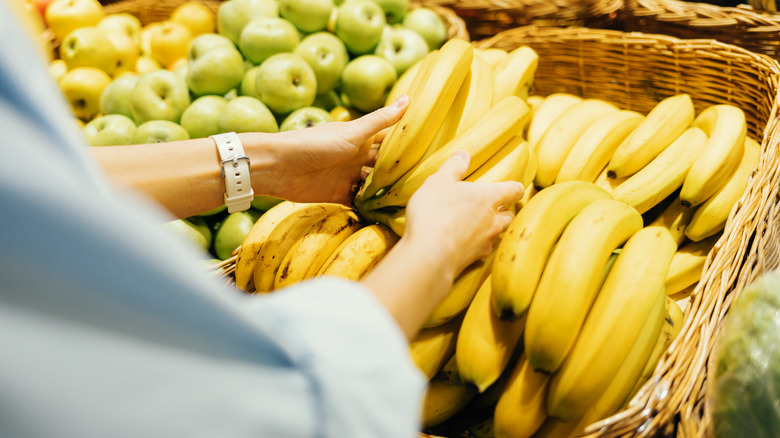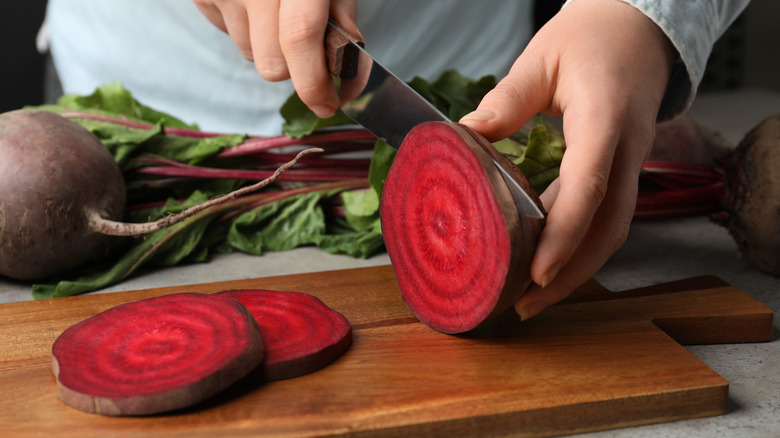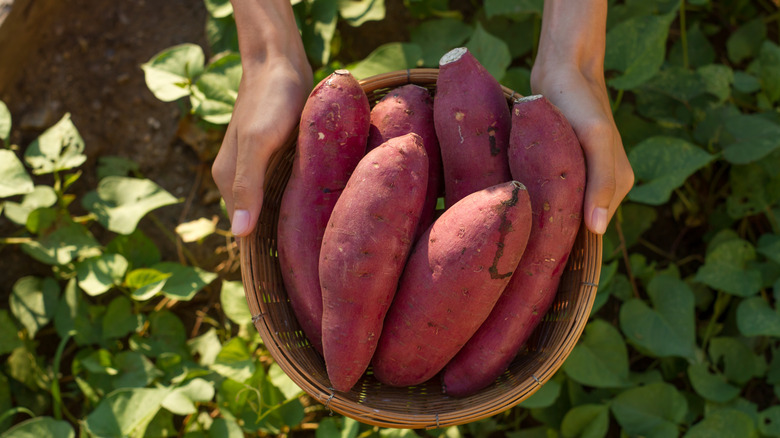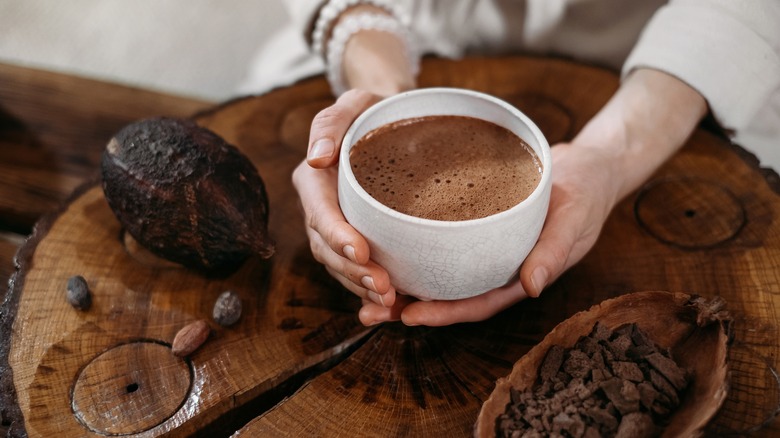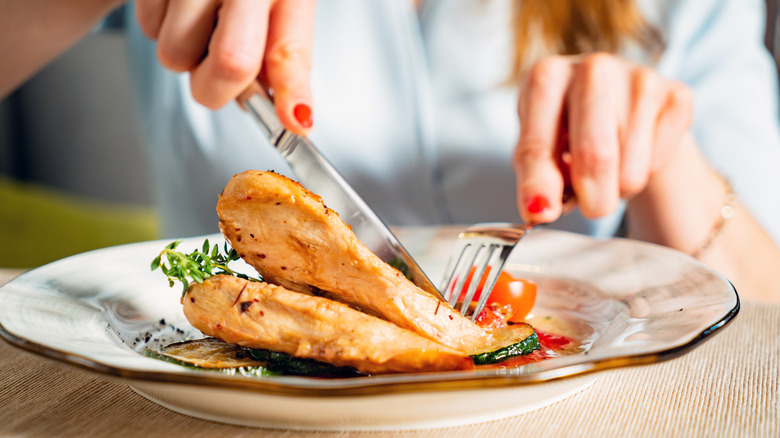The Top Mood-Boosting Foods That'll Help Brighten Your Day
When you really think about the importance of food, it's much more than a fuel source. Susan Albers, Doctor of Psychology, told Cleveland Clinic that the foods you choose to eat significantly impact your energy level, sleep pattern, and even your mood. Sugar, alcohol, starchy foods, and processed foods can all contribute to a bad mood. Ironically, these are some of the very ingredients predominant in many "comfort foods" people seek when they're emotionally eating. Cookies and bread might boost your energy and mood for a moment, but they can also cause an intense crash that has an adverse effect on how you feel.
Fortunately, there are several healthier options to choose from that can lift your spirits and keep them high. By opting for these foods, you'll do both your brain and body a favor. Instead of thinking about what you can't eat or shouldn't eat, Dr. Albers recommends adding one mood-boosting food each day to see improvement.
Bananas
A member of the botanical berry family, bananas can put you in a good mood because of their tryptophan — an essential amino acid that caters to serotonin production, which helps with regulating your mood. According to WebMD, a medium banana can have about 11 milligrams of tryptophan. They add that some other foods with tryptophan include nuts and seeds, cheese, oats, turkey, chicken, tuna, and milk.
Deemed the first superfood by Harvard T.H. Chan School of Public Health, research shows that bananas contain another chemical that can help us feel good. A 2000 study published in the Journal of Agricultural and Food Chemistry found that they have up to 10 mg of dopamine, which is considered a "feel-good chemical", per Verywell Mind. For a few more ways to naturally boost dopamine, Healthline recommends eating more protein and less saturated fat, exercising, listening to music, meditating, spending a healthy amount of time in the sun, and getting enough sleep.
Beets
Women should add beets to their diet because they can target PMS symptoms, including mood swings. Dr. Albers tells Cleveland Clinic that beets are an ideal food if you're experiencing any bouts of anxiety or stress. Just 3 and a half ounces (100 grams) can provide you with 4% of the vitamin C you need for the day, according to Healthline, and vitamin C is one of the factors that makes beets a mood booster food.
"One of the best things you can do to help your immune system and to boost your mood is to add foods that are high in vitamin C," Dr. Albers said. Other foods that are high in vitamin C include oranges, mangoes, lemons, kiwi, broccoli, bell peppers, and strawberries. Just know that if you take supplements with more than 400 mg, there's a good chance your body may not absorb all of it.
Sweet Potatoes
Sweet potatoes aren't just for the holidays. Their fiber and magnesium make these root vegetables a good choice for boosting your mood. Dr. Albers told Cleveland Clinic that the fiber in sweet potatoes can curb cravings and reduce emotional eating. Magnesium is helpful for lowering anxiety.
According to Healthline, low levels of magnesium can contribute to a higher risk of depression. A 2015 study published in the Journal of the American Board of Family Medicine found that people who don't have enough magnesium are at a 22% higher risk of experiencing depression. Not only does magnesium help prevent depression, but it can also reduce symptoms in people already struggling with it. According to a 2017 randomized controlled trial published in PLoS One, people with mild to moderate depression can start to see an improvement in symptoms after taking 248 mg of magnesium every day.
WebMD also lists Chinook salmon, halibut, Atlantic mackerel, and Atlantic pollock as top sources of magnesium. Spinach, okra, bran cereals, quinoa, black-eyed peas, tofu, tempeh, cashews, flaxseed, and peanut butter are some other sources of the mineral.
Cacao
If you're looking for a reason to eat more chocolate, this is it — but it's the dark chocolate (not the milky stuff) that you're after. A 2022 study published in The Journal of Nutritional Biochemistry found that 85% cocoa dark chocolate impacts your mood for the better. Adults who ate 30 g of 85% cocoa dark chocolate every day for 3 weeks reduced negative moods. In comparison, the same test was performed with 70% cocoa dark chocolate and it produced no improvement.
The magic behind this study lies in the brain-gut connection. Dark chocolate that's at least 85% cocoa acts as a prebiotic. Medical News Today defines prebiotics as fibers that feed probiotics, which support the good bacteria our gut needs for top-tier health. Per True Health Initiative, a healthy gut is a happy gut, and a happy gut results in a happy mood.
Cleveland Clinic adds that cocoa is full of polyphenols. As potent antioxidants, polyphenols have an anti-inflammatory effect that also helps your mood.
Protein
A 2007 review published in the Journal of Nutrition found that protein is linked to increased levels of dopamine and norepinephrine. Dr. Albers told Cleveland Clinic that these chemicals in the brain play an important role when it comes to not only your mood, but also your motivation and concentration. Foods such as beef, chicken, turkey, and eggs are good sources of protein. Beef can also increase your vitamin D levels, which is also linked to a good mood. If you are vegetarian or vegan, chickpeas, lentils, and tofu are ideal sources of protein.
According to Mental Health Connecticut, eating more protein can also help you eat less sugar. This way, you can control your sweet tooth and stabilize blood sugar levels. While it may be tempting to reach for a protein bar, be careful because some of them can have just as much sugar as cookies and donuts.

